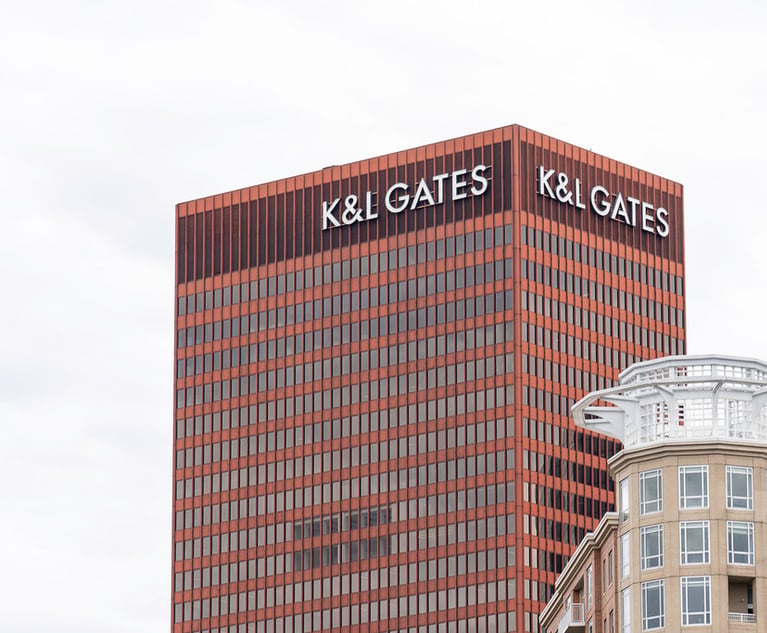Court: No Insurance Coverage for Stolen Trailer That Wasn't in 'Transit'
The Pennsylvania Superior Court has issued a decision explaining whether a loaded trailer, which had been stolen, was still in transit for the purposes of the trucking company's insurance policy.
March 08, 2018 at 02:22 PM
4 minute read

This story is reprinted with permission from FC&S Legal, the industry's only comprehensive digital resource designed for insurance coverage law professionals. Visit www.fcandslegal.com to subscribe.
The Pennsylvania Superior Court has issued a decision explaining whether a loaded trailer, which had been stolen, was still in transit for the purposes of the trucking company's insurance policy.
The Case
On May 8, 2008, at about 8 a.m., a driver for Naro Enterprises Inc., a trucking company, picked up a trailer loaded with steel rods from Sandvik Materials to be delivered to a location in Houston.
Prior to setting out for Texas, the driver returned to the Naro site at approximately noon May 8, 2008, to allow for a pre-trip inspection. Some damage to the trailer was discovered and an independent welder was brought to Naro to make the needed repair. This repair was done on May 10, 2008.
The loaded trailer remained at the Naro site in anticipation of continuing the delivery trip May 12, 2008.
The trailer, however, was last seen at Naro on May 11, 2008, sometime after noon. At least 75 hours had passed from the time the trailer had arrived at Naro until it had last been seen at Naro.
At approximately 1 a.m. May 12, 2008, at least 85 hours after arrival at Naro, the trailer and the steel rods were discovered to have been stolen.
On May 13, 2008, Naro submitted a claim to its insurance carrier, Great American Insurance Group, seeking in excess of $210,000 for the stolen goods.
Great American denied the claim, asserting that coverage only was provided for goods while in transit. Great American further asserted that transit had ended after 72 hours had passed with the trailer at the Naro site.
Naro sued.
A Luzerne County trial court granted summary judgment in favor of Great American, and Naro appealed. It argued that the trial court had erred when it had ruled that Naro's stolen trailer had not been in “transit” at the time of the theft.
The Great American Policy
The Great American policy provided:
“Covered property means property of others that you have accepted for transportation as a motor carrier under your tariff and bill of lading or other written contract.
We cover property only while it is:
a. contained in or on a land vehicle while in 'transit' and/or during 'loading' and 'unloading.'
'Transit' begins with the actual movement of the goods from point of shipment bound for a specific destination. It remains in transit during the ordinary, reasonable and necessary stops, interruptions, delays or transfers incidental to the route and method of shipment.
'Transit' ends when any of the following occurs:
1. Covered property is accepted by, or on behalf of, the consignee at the intended destination or at any intermediate point short of the original intended destination.
2. Seventy-two hours after arrival at destination.
3. Any other stop that exceeds 72 hours.”
The Superior Court's Decision
The appellate court affirmed.
In its decision, the court explained that, in its view, the definition of “'transit' ends” in the Great American insurance policy included three types of stops. First, when the cargo was accepted by the consignee. Second, when 72 hours expired after the arrival of the cargo at the destination. Third, when any “other” stop took place that exceeded 72 hours. Accordingly, the appellate court continued, “other” as used in the definition of “'transit' ends” referred to the immediately preceding conditions 1 and 2, and not (as Naro had contended) to the ordinary, reasonably, and necessary stops referred to in the definition of “'transit' begins.”
In other words, the appellate court said, cargo was covered as long as it was in transit. Transit included “any ordinary, reasonable and necessary stop,” as long as that stop was less than 72 hours long. Once a stop lasted more than 72 hours, the appellate court concluded, transit ended, and coverage for the cargo ceased—as it had in this case.
The case is Naro Enterprise v. Great American Insurance Group.
This content has been archived. It is available through our partners, LexisNexis® and Bloomberg Law.
To view this content, please continue to their sites.
Not a Lexis Subscriber?
Subscribe Now
Not a Bloomberg Law Subscriber?
Subscribe Now
NOT FOR REPRINT
© 2025 ALM Global, LLC, All Rights Reserved. Request academic re-use from www.copyright.com. All other uses, submit a request to [email protected]. For more information visit Asset & Logo Licensing.
You Might Like
View All



K&L Gates Sheds Space, but Will Stay in Flagship Pittsburgh Office After Lease Renewal
Trending Stories
- 1Courts Grapple With The Corporate Transparency Act
- 2FTC Chair Lina Khan Sues John Deere Over 'Right to Repair,' Infuriates Successor
- 3‘Facebook’s Descent Into Toxic Masculinity’ Prompts Stanford Professor to Drop Meta as Client
- 4Pa. Superior Court: Sorority's Interview Notes Not Shielded From Discovery in Lawsuit Over Student's Death
- 5Kraken’s Chief Legal Officer Exits, Eyes Role in Trump Administration
Who Got The Work
J. Brugh Lower of Gibbons has entered an appearance for industrial equipment supplier Devco Corporation in a pending trademark infringement lawsuit. The suit, accusing the defendant of selling knock-off Graco products, was filed Dec. 18 in New Jersey District Court by Rivkin Radler on behalf of Graco Inc. and Graco Minnesota. The case, assigned to U.S. District Judge Zahid N. Quraishi, is 3:24-cv-11294, Graco Inc. et al v. Devco Corporation.
Who Got The Work
Rebecca Maller-Stein and Kent A. Yalowitz of Arnold & Porter Kaye Scholer have entered their appearances for Hanaco Venture Capital and its executives, Lior Prosor and David Frankel, in a pending securities lawsuit. The action, filed on Dec. 24 in New York Southern District Court by Zell, Aron & Co. on behalf of Goldeneye Advisors, accuses the defendants of negligently and fraudulently managing the plaintiff's $1 million investment. The case, assigned to U.S. District Judge Vernon S. Broderick, is 1:24-cv-09918, Goldeneye Advisors, LLC v. Hanaco Venture Capital, Ltd. et al.
Who Got The Work
Attorneys from A&O Shearman has stepped in as defense counsel for Toronto-Dominion Bank and other defendants in a pending securities class action. The suit, filed Dec. 11 in New York Southern District Court by Bleichmar Fonti & Auld, accuses the defendants of concealing the bank's 'pervasive' deficiencies in regards to its compliance with the Bank Secrecy Act and the quality of its anti-money laundering controls. The case, assigned to U.S. District Judge Arun Subramanian, is 1:24-cv-09445, Gonzalez v. The Toronto-Dominion Bank et al.
Who Got The Work
Crown Castle International, a Pennsylvania company providing shared communications infrastructure, has turned to Luke D. Wolf of Gordon Rees Scully Mansukhani to fend off a pending breach-of-contract lawsuit. The court action, filed Nov. 25 in Michigan Eastern District Court by Hooper Hathaway PC on behalf of The Town Residences LLC, accuses Crown Castle of failing to transfer approximately $30,000 in utility payments from T-Mobile in breach of a roof-top lease and assignment agreement. The case, assigned to U.S. District Judge Susan K. Declercq, is 2:24-cv-13131, The Town Residences LLC v. T-Mobile US, Inc. et al.
Who Got The Work
Wilfred P. Coronato and Daniel M. Schwartz of McCarter & English have stepped in as defense counsel to Electrolux Home Products Inc. in a pending product liability lawsuit. The court action, filed Nov. 26 in New York Eastern District Court by Poulos Lopiccolo PC and Nagel Rice LLP on behalf of David Stern, alleges that the defendant's refrigerators’ drawers and shelving repeatedly break and fall apart within months after purchase. The case, assigned to U.S. District Judge Joan M. Azrack, is 2:24-cv-08204, Stern v. Electrolux Home Products, Inc.
Featured Firms
Law Offices of Gary Martin Hays & Associates, P.C.
(470) 294-1674
Law Offices of Mark E. Salomone
(857) 444-6468
Smith & Hassler
(713) 739-1250





